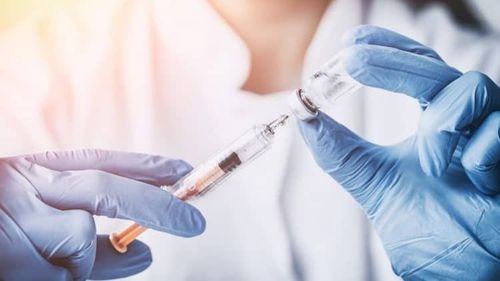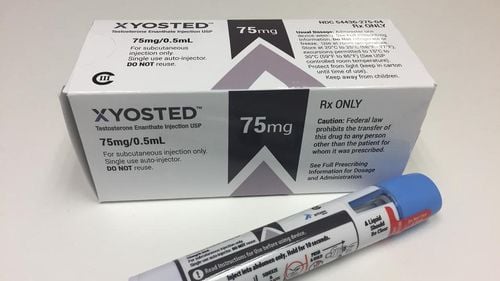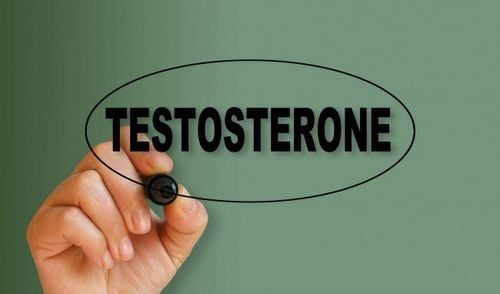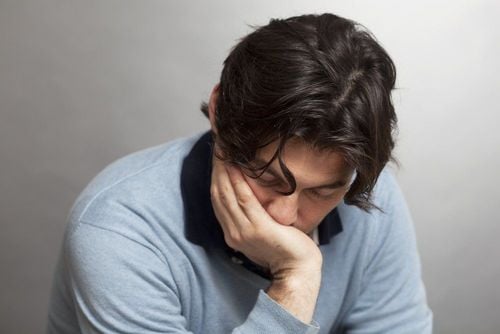This is an automatically translated article.
Testosterone is a sex hormone present in both men and women. The main function of Testosterone hormone is to control sex life, regulate sperm production and promote muscle growth as well as increase energy for the body to stay healthy and full of life.1. How much testosterone is normal?
Depending on protein status, thyroid function and other factors, the normal level of testosterone in the blood will vary widely. Specifically:According to the American Urological Association (AUA), for men, normal testosterone levels are at least 300 nanograms per deciliter (ng/dL). If it is less than 300 ng/dL then the man will have low testosterone levels.
According to the Mayo Clinic, for women 19 years of age and older, normal testosterone levels will range from 8 to 60 ng/dL. Testosterone levels will peak around 18-19 years of age before it gradually declines throughout the rest of adulthood.
During pregnancy, testosterone is necessary for the normal and healthy growth of the fetus in the womb. Testosterone controls the development of the male reproductive system. In addition, testosterone levels during pregnancy also affect the baby's left and right brain function. In order for the brain of the fetus to be healthy, testosterone levels must be within very narrow limits, if it is exceeded, the fetus may have autism later in life.
During puberty, testosterone helps perfect the physical functions as well as shape of a boy, it can help change the voice, broad shoulders and facial structure to become more masculine, stronger .
In perimenopausal women, testosterone is made mainly in the ovaries, levels decrease after menopause (starting between the ages of 45-55).
2. The role of testosterone in women's health
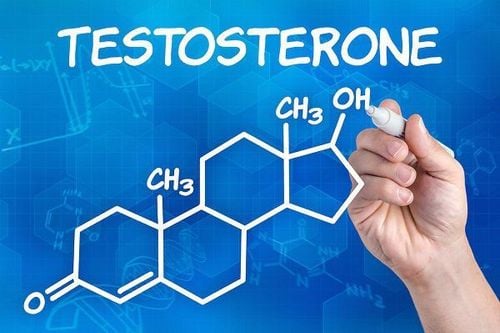
Trong suốt cuộc đời của người phụ nữ, nồng độ testosterone thay đổi liên tục một cách tự nhiên
Almost everyone thinks that testosterone is a hormone only found in men and that it symbolizes male characteristics. However, the truth is that both men and women need a certain amount of testosterone. Men will have higher testosterone levels than women. In women, small amounts of this hormone are produced usually in the adrenal glands and ovaries.
According to research results from the University of Rochester Medical Center, testosterone levels in women usually range from 15 to 70 ng/dL. However, there are still no specific guidelines for how low testosterone levels are in women.
3. How does low testosterone affect women's health?
Women with low levels of testosterone in the blood often feel tired, lethargic and lack of energy. Testosterone deficiency in women can cause the following symptoms:Sluggishness Muscle weakness Frequent fatigue Sleep disturbances Decreased sex drive Weight gain Having fertility problems Irregular menstrual cycles Loss of Bone density Vaginal dryness The signs and symptoms of low testosterone are often very noticeable, so doctors can diagnose a woman with testosterone deficiency through conditions such as depression, anxiety, and stress. chronic, thyroid diseases, perimenopause transition to menopause.
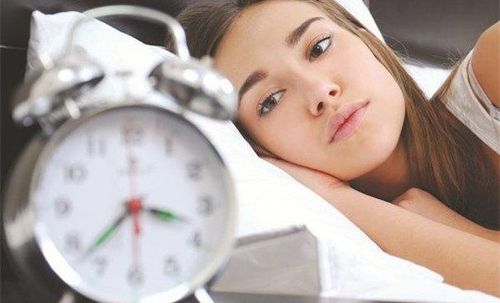
Sự thiếu hụt testosterone ở nữ giới có thể gây rối loạn giấc ngủ
4. Causes of low testosterone in women
Testosterone levels naturally decline with a woman's age and menopause. The main causes of this condition include:Menopause and aging lead to a decrease in the level of the hormone testosterone in the blood. Problems with the ovaries, pituitary gland, or adrenal glands. Similar to other hormones, such as estrogen (the female hormone), testosterone also naturally declines with age. As a woman ages, her testosterone levels decrease, especially as a woman enters menopause. During menopause, women have lower testosterone levels because the ovaries make less of the hormone than usual. In addition, the use of drugs to combat the side effects of menopause can also cause testosterone levels to drop. In addition, disorders of the ovaries and adrenal glands are also the main causes of testosterone decline in women.
5. The role of testosterone in men's health
Testosterone is a hormone that is vital to every function of men, from the reproductive system and sexual performance to the development of muscle mass and bone density. It is produced mainly in the testes and to a small extent in the adrenal glands. The main functions of testosterone hormone for men's health include:Endocrine system: The body's endocrine system includes glands that produce hormones. When the body has not yet been born, the hormone testosterone has already begun to work. It plays an important role in the formation of male genitalia. During puberty, testosterone is responsible for the development of male attributes, such as a deep voice, and growth of beard and body hair. Besides, testosterone also promotes the growth of muscles and shapes the sex drive of men.
Reproductive system: under the influence of testosterone, male genitalia will be formed around the seventh week of pregnancy. During puberty, testosterone is active to help testicles and penis grow. The testicles will produce a steady stream of testosterone and supply new sperm each day.
Sexual ability: increased testosterone levels during puberty make men feel more sexual desire than before.
Central nervous system: Testosterone also plays an essential role in determining certain behaviors, such as aggression and leadership. In addition, this hormone is also a measure of competitiveness and helps boost self-esteem.
Skin and hair: testosterone promotes the formation and growth of hair on the head, hair in the armpits, around the genitals arms, legs and chest.
Muscles, Fats and Bones: Testosterone is responsible for muscle growth, interacts with receptors in genes, leads to protein synthesis. In addition, testosterone also helps increase bone density, plays an important role in the production of red blood cells from the bone marrow.
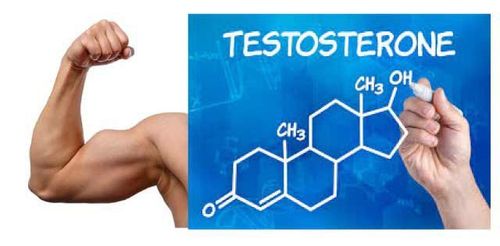
Testosterone quyết định tới sự phát triển của cơ bắp
6. How does low testosterone affect men's health?
Testosterone is considered as the "lifeblood" of men. If there is a deficiency of this hormone in the body, men will face many problems both physically and mentally, significantly affecting their lives:Decrease in vitality: Change in appearance: testosterone is lost. decline leads to thinning of hair and hair, sagging muscles, easy belly fat and weight gain. Besides, the mood and performance of men also decreased a lot. Depression, trouble sleeping: people with low testosterone often have clinical signs of depression, irritability, anger, a tendency to like solitude and frequent sleep disturbances. Decreased physical strength: the decline in testosterone causes muscle mass and flexibility to become weaker, endurance decreases, muscle tone decreases, making it difficult for men to do heavy work. Organ system problems: Low testosterone causes distraction, mood swings, or fatigue. In particular, there is a high risk of diseases such as coronary heart disease, high blood pressure, diabetes, and osteoporosis. Physiological decline: Decreased libido: low testosterone causes men to have reduced sex drive, no feeling of interest in sex, and difficulty achieving orgasm when "in love". Premature Ejaculation: Decreased erection of the penis and poor sperm retention lead to premature ejaculation. Erectile dysfunction Decreased sperm quality and quantity Early menopause
7. Causes of low testosterone in men
The main causes of low testosterone in men include:Stress Irregular sex often smoking Medicines to treat diseases such as sedatives, sleeping pills, drugs to treat stomach ulcers, joints, ... External environmental factors such as air pollution, smoke inhalation, toxic substances Harmful habits such as often staying up late, excessive use of foods with bad fats such as oils animal fat, fast food, preservatives, drinking a lot of alcohol, ...

Stress là một trong những nguyên nhân gây suy giảm testosterone ở nam giới
8. Remedies for low testosterone
To be able to increase testosterone for a healthy and energetic body, both men and women should note the following:Balance body weight by exercising regularly Get enough sleep zinc supplements for the body Fully supplemented with vitamins and necessary nutrients in the daily diet Use healthy fats such as Omega -3, olive oils, grass oils, canola oils, fats unsaturated, egg yolk,... Avoid abuse of stimulants such as alcohol Quit smoking
Please dial HOTLINE for more information or register for an appointment HERE. Download MyVinmec app to make appointments faster and to manage your bookings easily.
Reference source: Webmd.com



